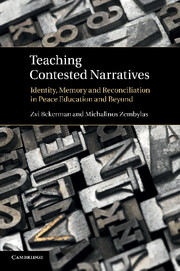Book contents
- Frontmatter
- Contents
- Acknowledgments
- Permissions
- Part I Introduction and theoretical underpinnings
- Part II Living and teaching contested narratives
- 4 Victims and perpetrators
- 5 (Im)possible openings
- 6 The everyday challenges of teaching children from conflicting groups
- 7 The emotional complexities of teaching contested narratives
- Part III Mourning, forgiveness and reconciliation
- Part IV Conclusions
- References
- Index
6 - The everyday challenges of teaching children from conflicting groups
Published online by Cambridge University Press: 05 December 2011
- Frontmatter
- Contents
- Acknowledgments
- Permissions
- Part I Introduction and theoretical underpinnings
- Part II Living and teaching contested narratives
- 4 Victims and perpetrators
- 5 (Im)possible openings
- 6 The everyday challenges of teaching children from conflicting groups
- 7 The emotional complexities of teaching contested narratives
- Part III Mourning, forgiveness and reconciliation
- Part IV Conclusions
- References
- Index
Summary
In the two previous chapters we became acquainted with the many difficulties encountered by teachers when confronting contested issues as these relate to their immediate national contexts and learning experiences. In this and the following chapter we will focus on daily classroom practices and events. We will see how classroom topics are invaded by the wider sociocultural and political context unexpectedly and/or intentionally. We will also see how teachers – with their own internal struggles, concerns and ambivalences – are not always successful in their efforts to overcome these challenges and support open dialogue between children coming from conflicting groups.
The integrated bilingual schools in Israel search for ways to overcome the difficulties concerning conflicting historical narratives which are perceived as the main obstacle towards reconciliation. Schools in the Republic of Cyprus (especially those in which Turkish-speaking students are enrolled) search for ways to overcome the challenges of teaching about peaceful coexistence, while the political problem remains unresolved and the Turkish occupation of the north part of Cyprus continues. In both cases the schools have to do this under the vigilant supervision of the education ministry and public opinion, knowing full well that any perceived deviations from the “official history” could create serious problems for teachers. As we have described earlier, official history leaves little space for alternative narratives in schools. For example, curricula in both Israel (Al-Haj, 2002, 2005; D. Gordon, 2005) and the Republic of Cyprus (Zembylas, 2008a, 2010a, in press) focus on Jewish and Greek nation-building, respectively, and exclude narratives that might question the hegemonic national identity. The classroom events described in this chapter – the first event comes from Israel and the second one from Cyprus – are excellent examples of how folk (historical) knowledge, that of the students and their teachers (none of whom are trained as history teachers), and the pedagogical practices adopted allow or do not allow for reconciliatory openings between students coming from conflicting groups.
- Type
- Chapter
- Information
- Teaching Contested NarrativesIdentity, Memory and Reconciliation in Peace Education and Beyond, pp. 100 - 113Publisher: Cambridge University PressPrint publication year: 2011



